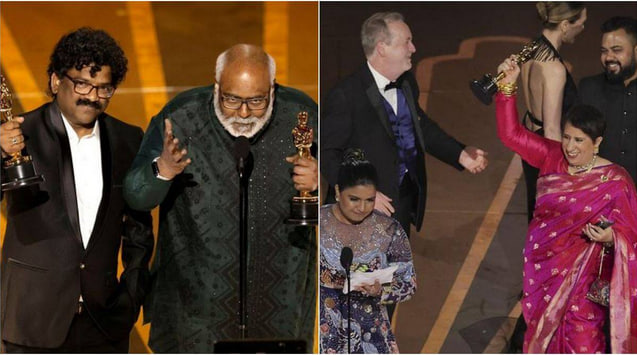True-colours : On the significance of India’s Oscar wins
The Oscars served as a marker of America’s nod to inclusivity
India woke-up at dawn on Monday to watch the 95th Academy Awards held at Dolby Theatre, Los Angeles, and cheer the two wins. Director Kartiki Gonsalves’ Tamil documentary The Elephant Whisperers became the first ever Indian production to win the Oscar for Best Documentary Short. Director S.S. Rajamouli’s Telugu film RRR became the first Indian feature-production to win an Oscar when its catchy ‘Naatu Naatu’ won for Best Original Song (music composer M.M. Keeravani and lyricist Chandrabose). Amid this cheer, however, director Shaunak Sen’s All That Breathes lost the Best Documentary Feature to director Daniel Roher’s Navalny. RRR’s win is significant in the context of India’s last wins at the Oscars in 2009, from the British production, Slumdog Millionaire — Best Original Song and Score for music composer A.R. Rahman and lyricist Gulzar’s ‘Jai Ho’, and Resul Pookutty for Best Sound Mixing. While this Danny Boyle film can be described as a western world’s interpretation of Indian cinema’s song, dance and mainstream masala, RRR is an Indian mainstream production that is unapologetic about its spectacle action pieces and dance numbers. The ‘Naatu Naatu’ win can be viewed as the Academy’s nod to cinema that captured the imagination of a multicultural American society.
The awards have again brought to the fore the debate whether the Oscars are ‘too White’, particularly with the nomination of Andrea Riseborough in the Best Actress category for To Leslie, widely criticised for snubbing potential names such as Viola Davis for The Woman King and Danielle Deadwyler for Till, and forcing the Academy to probe whether she had secured the nod due to aggressive campaigning from her Hollywood peers . The silver-lining of inclusivity came in the form of Everything Everywhere All At Once (the story of an immigrant Chinese family), securing 11 nominations and winning seven awards. Its top prizes included Best Picture and Best Director, and an award for Vietnamese-American Ke Huy Quan in the Best Supporting Actor category. Its lead actress Michelle Yeoh became the first Asian woman to receive a nomination and win in the Best Actress category. It is also the first Best Actress win for a non-white actress in 20 years. Cheers greeted the 60-year-old when she urged women not to let anyone ever tell them that they are past their prime. The other non-white film to make its presence felt through nominations and its win for Best Costume Design was Black Panther: Wakanda Forever. In the years ahead, these multicultural wins should pave the way for more artistes to take to the global stage.
